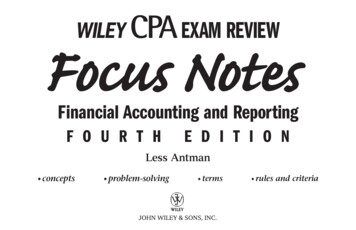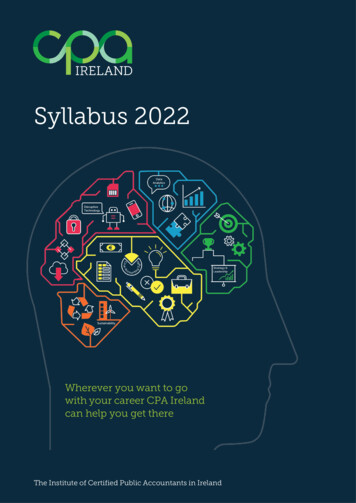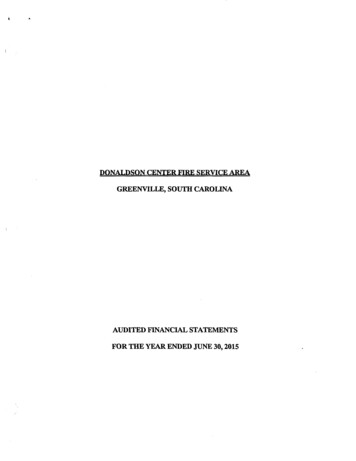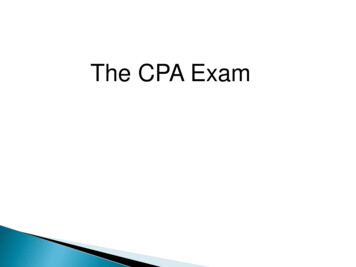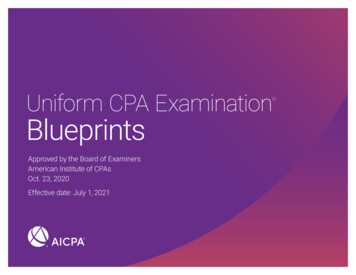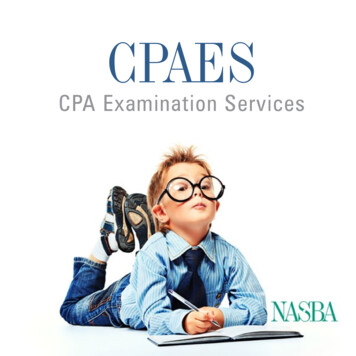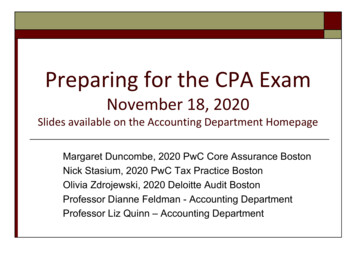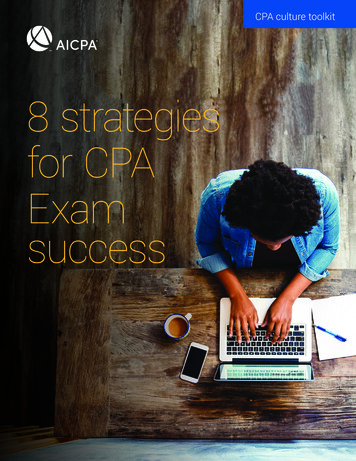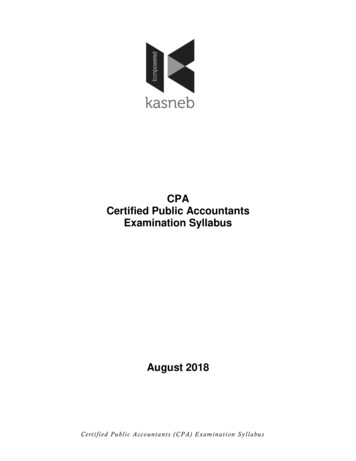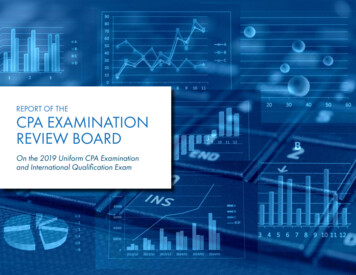
Transcription
REPORT OF THECPA EXAMINATIONREVIEW BOARDOn the 2019 Uniform CPA Examinationand International Qualification Exam
TABLE OF CONTENTSCPA EXAMINATION REVIEW BOARDCPA EXAMINATION REVIEW BOARDCREATION AND PURPOSECHARGE FROM BOARDSOF ACCOUNTANCY344150 Fourth Avenue North, Suite 700 Nashville, TN 37219 T/615.880.4200 F/615.880.4290REPORT OF THE CPA EXAMINATION REVIEW BOARDTo the Boards of Accountancy of the Fifty-Five Jurisdictions of the United States of America:We have reviewed and evaluated the policies and procedures utilized in the preparation, grading and administration of theUniform CPA Examination and the International Qualification Examination for the year ended December 31, 2019.Our review and evaluations were conducted for the purpose of determining the appropriateness of those policies and procedures for reliance by the Boards of Accountancy of the fifty-five jurisdictions of the United States of America in discharging their responsibility to test the qualifications of candidates for licensure as Certified Public Accountants.Based on our review and evaluations, we believe that the Boards of Accountancy may rely on the Uniform CPA Examinationand the International Qualification Examination in carrying out their licensing responsibilities for the year ended December31, 2019.This report is intended solely for the information and use of the Boards of Accountancy, and is not intended to be and shouldnot be used by anyone other than the specified parties.CPA Examination Review BoardMay 18,2020UNIFORM CPA EXAMINATION ANDINTERNATIONAL QUALIFICATIONEXAMINATIONDESCRIPTION OF CPA EXAMINATIONREVIEW BOARD PROCEDURESUNIFORM CPA EXAMINATIONDEVELOPMENTPRACTICE ANALYSISSTANDARD SETTINGNATIONAL CANDIDATE DATABASEDELIVERYSCORINGPOLICIES AND PROCEDURES OF THEBOARD OF EXAMINERS ANDTHE EXAMINATIONS TEAMPSYCHOMETRIC ASSESSMENTTECHNOLOGY ASSESSMENT455-6555666666INTERNATIONAL QUALIFICATIONEXAMINATION7REVIEW AND EVALUATION FRAMEWORKOF THE CPA EXAMINATIONREVIEW BOARD8MEMBERS OF THE CPAEXAMINATION REVIEW BOARD9CPA EXAMINATION REVIEWBOARD STAFF10CONSULTANTS PROVIDING SUPPORT TOTHE CPA EXAMINATION REVIEWBOARD10EXHIBIT 1 – TWELVE STEPS FOREFFECTIVE TEST DEVELOPMENT11
UNIFORM CPA EXAMINATIONCREATION & PURPOSEThe Uniform CPA Examination (Examination) is administered pursuant to a contract among the National Association of StateBoards of Accountancy (NASBA), on behalf of its constituent members (Boards of Accountancy), the American Institute ofCPAs (AICPA), and Prometric.Few Boards of Accountancy have the resources to evaluatethe psychometric quality and content of a licensing examination or to review its preparation, scoring and administration. Moreover, few Boards of Accountancy have theresources to evaluate the security and integrity of the electronic architecture and data communications surrounding acomputer-based test (CBT). Because such evaluations andreviews are highly technical and time-consuming activities,they can be performed more effectively by a single agencyacting on behalf of all Boards of Accountancy. Recognizing this need, the CPA Examination Review Board (ERB)was established as a committee of NASBA and reports directly to the Boards of Accountancy.NASBA acts as the central clearinghouse to which all Boards of Accountancy or their designee submitsinformation on eligible candidatesand from which all Boards of Accountancy receive advisory scoresand other Examination data.The AICPA determines the content ofthe Examination, prepares the items/simulations, determines the methodof scoring the Examination (includingthe choice of psychometric model),performs and coordinates the scoring of all test item formats includingsimulations and constructed responseexercises, provides all quality controlsystems for test scoring, prepares advisory scores, and conducts statisticalanalyses of Examination results.Prometric operates a network ofcomputer-based test centers wherecandidates take the Examinationand is responsible for examinationdelivery at authorized test centers.COMMITTEE CHARGEThe ERB shall review, evaluate and report on the appropriateness of the policies and procedures utilized in thepreparation, grading and administration of the UniformCPA Examination and other examinations in general useby the Boards of Accountancy for the licensing of CertifiedPublic Accountants. In carrying out its responsibilities theERB shall examine such records and make such observations, inspections and inquiries, as it deems necessary. TheERB shall report annually to the Boards of Accountancy.
INTERNATIONAL QUALIFICATION EXAMINATIONIQEX PROCEDURESBeginning with the November 2012 administration, the IQEX transitioned to a new format thatuses an administration of the Uniform CPA Examination’s Regulation section as the requiredexamination.As part of the transition, the IQEX no longer hasa dedicated content specification outline (CSO)and instead adopts the content outlined in theRegulation section of the Uniform CPA Examination Blueprint. Therefore, we reviewed and evaluated the same procedures for IQEX as we didfor the CPA Examination. We also reviewed andevaluated the IQEX candidate application andapproval process, which is performed by NASBA, and the 2019 IQEX technical report, whichwas prepared by NASBA to provide validity evidence for the use of IQEX.The purpose of the International Qualification Examination (IQEX) is to facilitate the U.S. CPA qualification process for thoseaccounting professionals from other countries whose professional bodies have entered into Mutual Recognition Agreements(MRAs) with the U.S. accounting profession and to provide reasonable assurance to boards of accountancy that those whopass the examination possess the level of technical knowledge and skills necessary for licensure to protect the public interest.The International Qualification Appraisal Board (IQAB), a joint body of the AICPA and NASBA, is charged with overseeing,on behalf of the U.S. accounting profession, the preparation of MRAs with the accounting profession in countries seekingmutual recognition of accounting qualifications. Education,examination, and experience are the principal elements considered in granting a professional accounting designation to perform the attest function. In preparing an MRA, IQAB reviewsthe education requirements, the required body of knowledge, and the required standards of professional practice with respect to the granting of the professional accounting designation.IQAB has currently established MRAs with the following professional bodies: Institute of Chartered Accountants in Australia (ICAA)CPA Australia (CPAA) – effective June 2018Chartered Professional Accountants Canada (CPAC)Hong Kong Institute of Certified Public Accountants (HKICPA)Chartered Accountants Ireland (CAI)Instituto Mexicano De Contadores Públicos (IMCP)New Zealand Institute of Chartered Accountants (NZICA)Institute of Chartered Accountants of Scotland (ICAS)South African Institute of Chartered AccountantsThe intent of IQEX is to test the differences between the Federal Taxation, Business Laws, and Ethics practices of the UnitedStates and the relevant practices of the MRA countries. Accounting professionals from the MRA countries have alreadydemonstrated competence in the areas that are the same in the candidate’s home country and the United States by virtue ofmeeting the requirements outlined in the MRA and remaining a Member in Good Standing with the professional accountingbody in the candidate’s home country.
DESCRIPTION OF EXAMINATION REVIEW BOARD PROCEDURESDEVELOPMENTPRACTICE ANALYSISSTANDARD SETTINGThe Examination is developed by the AICPA Examinations Team (Examinations Team) in accordance withblueprints established by the AICPA Board of Examiners (BOE). The blueprints used in the 2019 Examinationare based on the 2016 Practice Analysis. Examinationcontent is reviewed and modified by the Content Preparation Subcommittees and is given final approval by theContent Committee. We reviewed and evaluated the development of the Examination. Our review included conferences with members of the Examinations Team, observations of the activities of the BOE, its Content Committeeand Content Preparation Subcommittees, and interviewswith the Examinations Team leadership and staff. Wereviewed and evaluated systems security controls andcompliance with certain administrative policies and procedures.The Practice Analysis Oversight Group established bythe BOE designed and carried out an updated PracticeAnalysis, which was completed in 2016 as a basis forthe blueprints used in the version of the Uniform CPA Examination launched in April 2017. In connection with ourreview and evaluations completed for the year endedDecember 31, 2019, we monitored and reviewed eachmajor stage of the Practice Analysis, including the overallframework for this update and its oversight, the technicalresearch design of the study, the sampling proceduresused including defining the target population and thesampling frame, the design and use of the matrix sampling methods, the planning and execution of the computer-based survey, and the statistical analysis of thesurvey results and reporting thereof.The AICPA conducted passing score studies to establishnew standards for the Examination launched in 2017.In determining the new passing scores, the AICPA usedsound scientific standard setting methods based on solidresearch; the methods used have a long history of use byhigh-stakes testing agencies and had no obvious bias. Thedata were collected systematically, and statistical analyses were performed by psychometricians to ensure that thestandard-setting data were accurate and reproducible.The panel of experts who participated in the studies recommended a passing score for each section to the BOE.The BOE thoroughly discussed the panelists’ recommendations and approved new passing scores.We compared test items to the blueprints to determinecompliance with the approved guidelines.We evaluated the statistical quality indices for the results, such as the standard errors of the ratings, for themain sample and additional subsamples. We monitoredand reviewed the work of the Content Committee, whichused the Practice Analysis results to recommend revisionsand additions/deletions to the blueprint. Finally, we reviewed the work of the BOE in finalizing the updatedcontent and skill statements based on all of this empiricaland judgmental Practice Analysis work.The ERB performed a review of the standard setting process during the 2017 review. We reviewed the standardsetting plan and design, observed the structure of the process, attended several standard setting panel discussionsas well as the BOE deliberations and approval of the newpassing scores. In addition, we reviewed the standard setting technical report in support of the passing scores.
DESCRIPTION OF EXAMINATION REVIEW BOARD PROCEDURESNATIONAL CANDIDATE DATABASESCORINGNASBA receives candidate information from Boards ofAccountancy, or their designee, authorizing the candidate to test, and maintains such information in the National Candidate Database (NCD). We reviewed andevaluated the security policies and procedures related tothe NCD and the Gateway System.We reviewed and evaluated the policies and proceduresfollowed in the scoring and reporting of results of the Examination; we performed procedures related to the scoring of a selected sample; and we traced a sample ofscores through to the NCD. In addition, the psychometricconsultant reviewed and evaluated the validity evidencefor the Examination, including psychometric data fromthe tests, quality control policies and procedures, andstatistical analyses of the Examination results.Our procedures begin with testing the accuracy of thedatabase processes and receipt of information into thisdatabase and end with the release of the advisory score.DELIVERYThe Examination is delivered at Prometric test sites located throughout the jurisdictions of the Boards of Accountancy as well as selected international locations. Wereviewed and evaluated Prometric policies, proceduresand security controls relative to the Examination. We visited selected domestic and international Prometric sitesand observed the delivery of the Examination. We alsoreviewed and evaluated security controls and compliance with administrative policies and procedures.POLICIES AND PROCEDURES OF THE AICPABOARD OF EXAMINERS (BOE) AND THEAICPA EXAMINATIONS TEAMWe reviewed and evaluated the policies, proceduresand security controls of the BOE and Examinations Teamrelative to the development and scoring of the Examination. We also reviewed and relied on the work and reports of AICPA Internal Audit, Risk & Compliance relativeto the Examination.PSYCHOMETRIC ASSESSMENTTECHNOLOGY ASSESSMENTWe evaluated and relied upon a comprehensive analysis and evaluation of the security, processing integrityand availability of the communications and systems of allparties. We performed assessments based on guidelinesand standards set forth in COBIT, SSAE 18 guidelines,the AICPA Trust Services Principles and Criteria, ISO27001, and on industry best practices. The evaluationencompassed the Examination as a whole and many different sources of evidence were reviewed to support thereasonableness of the overall systems integrity, securityand sustainability of the Examination. The InformationTechnology Consultant assisted us in reviewing and evaluating the policies, procedures and controls employedby the AICPA, NASBA, and Prometric.Psychometric Consultants assisted us in reviewing andevaluating the policies and procedures employed bythe Examinations Team in preparing and scoring the Examination. We evaluated the psychometric model usedto calibrate and score the computer-adaptive tests andmany other important psychometric characteristics ofthe Examination such as the psychometric properties ofsimulations, candidate ability routing through adaptivetestlets, the standard setting methods utilized by the BOE,and the passing scores established thereby. We also reviewed the rater reliability of those constructed responsewritten communication exercises which were scored byhuman raters, the accuracy and consistency of the computer scoring of these written communication exercises,the correlations among test sections and item formats,and many other sources of validity evidence of the Examination. The Psychometric Consultants also assisted usin reviewing and evaluating the policies, procedures andcontrols for the Examination.
REVIEW AND EVALUATION FRAMEWORKOF THE EXAMINATION REVIEW BOARDThe “Twelve Components for Effective Test Development” as described in the Handbook of Test Development (Lane, Raymond, & Haladyna, 2016) provide the framework for our review and evaluations. The “Twelve Components for Effective TestDevelopment” are based on the Standards for Educational and Psychological Testing (AERA, APA, & NCME, 2014). Thesecomponents are described in detail in Exhibit 1.“The Standards for Educational and Psychological Testing (AERA, APA, & NCME, 2014) represent the consensus opinionconcerning all major policies, practices, and issues in assessment. This document, revised every decade or so, is sponsoredby three North American professional associations concerned with assessment and its application and practice: The American Educational Research Association (AERA), the American Psychological Association (APA), and the National Council onMeasurement in Education (NCME)”.12 COMPONENTS BASED ONStandards for Education andPsychological Testing1.2.Overall PlanContent Definition and ClaimsStatement (Practice Analysis)3. Content Specifications4. Item Development5. Test Design and Assembly6. Test Production7. Test Administration8. Scoring Test Responses9. Establishing Passing Scores(Standard Setting)10. Reporting Test Results11. Test Security12. Test Documentation
MEMBERS OF THE CPA EXAMINATION REVIEW BOARDDouglas W. Skiles, CPA, Chair of theERB and Prometric Lead. He is alsocurrently a shareholder with Skiles,Loop, Bremer & White, CPA’s PC. Heis a former NASBA Central Regional Director, Past Chair of NASBA’sRelations with Member Boards Committee, formerNASBA representative on the Board of Examiners’Practice Analysis Sponsor Advisory Group (SAG),Past Chair of the CBT Examination AdministrationCommittee, and former member of NASBA’s AuditCommittee and Education Committee and NASBAEnforcement Committee member. He served on theNebraska Board of Public Accountancy from 20032013, with three years as its Chair. He is a formerchair of the Nebraska Board’s Education & Examination Committee, Educational Advisory Committee,Legislative Committee, and a former member of theBoard’s Quality Enhancement Program Committee.During 2011-2013, he chaired the Experience WorkGroup, a collaboration between the Board, StateSociety and other stakeholders, which successfullypassed new experience requirements in 2013 for Nebraska CPA candidates. He served as an accountinginstructor for the University of Nebraska-Kearney andMcCook Community College.Barbara A. Ley, CPA.CITP, CFF. PastChair of the ERB. Member of the ERBsince 2016. Managing Shareholderand President of Barbara A. Ley, aProfessional Corporation; Past Chair ofthe Oklahoma State Board of Accountancy; Past President, Treasurer, Secretary, Board ofDirectors and Executive Committee member, and the2010 Hall of Fame inductee of the Oklahoma Societyof Certified Public Accountants (OSCPA); Past member of the AICPA Board of Examiners (BOE) and itsExecutive Committee; Past Chair of the BOE’s StateBoard Committee; Past member of AICPA Council,Past member of the OSCPA Education FoundationBoard of Directors; Past member of the National As-sociation of State Boards of Accountancy (NASBA)Nominating Committee; Past member of the NASBAEducation Committee; Past member of the CPA Licensing Examinations Committee.Marianne (Mari) DeVries, CPA is theAICPA Team Lead on the AICPA engagement team. Mari joined the Examination Review Board (ERB) in 2018after retiring as a shareholder with HBLCPAs, PC (2013 – 2018) and as themanaging partner of DeVries CPAs of Arizona, P.C.(1996 – 2013), specializing in nonprofit accountingand auditing throughout Arizona for over 30 years.In 2003, she served on the American Institute of Certified Public Accountants’ NPO Expert Panel, whichaddresses key concerns of exempt organizations nationally. From 2004 - 2009, she served on the ArizonaState Board of Accountancy (ASBA) (President 20072008), which is responsible for licensing and regulating CPAs in Arizona, after having served seven yearson the Board’s Accounting and Auditing StandardsCommittee and 3 years as the Board’s InvestigativeReviewer. In 2006, Mari joined the AICPA’s Task Forceto revise the Audit Guide for Nonprofit Organizations.The AICPA then invited Mari to become a part of theBoard of Examiners (BOE) who are responsible for thetechnical content of the Uniform CPA Exam where sheserved on the Audit, Content and Executive Committees of the BOE from 2008-2017.Janet Booker-Davis, CPA, MBA ERBmember and NASBA Team Lead. In2017/2018 she served as a memberof the NASBA Reorganization ImpactTask Force (RITF). Janet is founder andPresident of Booker Business Service,Inc. (BBS) – a CPA Firm located in Franklin, TN whichspecializes in working with small businesses. Janethas over 30 years of experience in accounting, taxation and business consulting. Prior to starting BBS, herexperiences included work in a supervisory capacityin an international CPA firm, Director of Internal AuditServices with a fortune 500 corporation, Vice President/Client Manager, Commercial Loan Officer withan international financial services corporation, andCorporate Controller for privately held companies. Inaddition to her license as a CPA, she is licensed as alife, health & accident insurance producer and holdsFINRA securities licenses, Series 6, 63 and 65. Janetwas appointed by the Tennessee Governor’s office toserve on the Tennessee State Board of Accountancyand has served as a board member since 2015. Sheis a member of the Tennessee Society of CPAs andAICPA. Janet has also been recognized on the list ofMarquis Who’s Who in the World.Ruben Davila, CPA, CFF, Esquire. AICPA Team Assistant Lead on the AICPAengagement team. Clinical Professorof Accounting and Diversity Officer atUniversity of Southern California’s Leventhal School of Accounting. Administrative Vice President and Member of the ExecutiveBoard of the USC Academic Senate. Past member ofthe California State Board of Accountancy. Past member of the AICPA/NASBA Board of Examiners (BOE).Past member of the BOE FARS Content Subcommittee. Past member of the AICPA/NASBA InternationalQualifications Appraisal Board. Current member ofthe NASBA Nominating Committee. Past member ofnumerous NASBA committees including the Nominating Committee, Education Committee, the State BoardCommittee. Current member of NASBA, AICPA CalCPA, California State Bar, Los Angeles County BarAssociation. Current member of various boards andcommittees at the University of Southern California including the Executive Board of the Academic Senate,the Provost’s Diversity and Inclusion Council, the Committee on Finance and Enrollment, the Committee, theCampus Climate Committee.
CONSULTANTSSTAFFMichael W. Harnish, CPA.CITP, CISA, CDP, EnCE. Consultant to the ERB since 1999. Retired; Current Boardof Directors of N-Able Consulting; Board of Directors of Two Rivers Water and Farming and chairman of theaudit committee; Board of Directors of Water Redevelopment Company and chairman of the audit committee;Past Board of Directors of Alliance Sports Group and chairman of the compensation committee; Past Boardof Directors of DeltaHawk Engines and chairman of the audit committee; Past COO/CIO of EthicsPoint, Inc.,Fios, Inc., CPA2BIZ, Dickinson Wright PLLC; Past President and CEO, Technology Consulting Partners LLC;Former Associate, Technology Consulting Solutions, Plante & Moran; Former Partner, Crowe, Chizek and Company (nowCrowe Horwath), Past Director of Consulting Services, Lotus Development Corp.; Former Member of Various AICPA Committees Including the Computerization Implementation Committee (CIC) and first Chairman of the Information TechnologyExecutive Committee and Membership Division; Former Member of the Illinois CPA Society Board of Directors. Recipient ofthe AICPA Innovative User of Technology and the AICPA Sustained Contribution Awards.Sheena Murphy, CPA, will beinvolved in planning, supervising, conducting the engagement,and will be the primary contactfor this engagement. Sheenais the CPA Exam Review BoardDirector. She is a former Accounting Manager,Qualifacts Systems, Inc. and is a former SeniorAuditor, Crowe Horwath LLC. She has prior experience with CPAES and NCD departments ofNASBA.Suzanne Lane, Ph.D. Consultant to the ERB since 2015. Professor, Research Methodology Program, Schoolof Education, University of Pittsburgh. Past President of the National Council of Measurement in Education.Past Vice President of Division D (Methodology and Measurement) of AERA. Member of AERA, APA, NCMEJoint Committee for the Revision of the Standards for Educational and Psychological Testing (1993-1999).Management Committee Member for the Revision of the 1999 Standards. Publications in Journal of Educational Measurement, Applied Measurement in Education, Educational Assessment, and Educational Measurement: Issues and Practice. Editorial Board member for Journal of Educational Measurement, Applied Measurementin Education, Educational Assessment, Educational Researcher, and Educational Measurement: Issues and Practice. Pastchair of the AICPA Psychometric Oversight Committee. Technical Advisory Committee member for the College Board, ETS,PARCC, PSI, U.S. Department of Education, NCEO and state assessment programs (DE, KY, NJ, NY, PA, TN, TX).Julie James, CPA, is the Examination Review Board Audit Manager. Former Technology andManagement Consultant, RSMUS LLP; Former Financial Reporting Manager, First Data Corporation, and Senior Internal Auditor with HCAHealthcare and LifePoint Health. Appointedmember of the TSCPA Accounting Career Education Committee.
EXHIBIT 1EXHIBIT 1: TEST DEVELOPMENTPROCESSTest Development ProcessTest DevelopmentComponentsTest Development RecommendationExampleRelevantStandards1.0, 2.0, 3.0, 4.0,5.0, 11.1, 12.2, 13.41. Overall PlanDevelop a detailed plan for the entire test developmentproject, including information on all test components, arationale for each component, and the specificmethods to be used to evaluate the validity of allintended test score interpretations and uses and thepsychometric quality of the test.2. Domain Definitionand ClaimsStatementName and define the domain to be measured. Providea clear statement of the claims to be made aboutexaminee knowledge, skills, and abilities (KSAs).1.0, 4.1, 11.2, 11.3,11.13, 12.43. ContentSpecificationsDevelop content specifications to guide itemdevelopment, form assembly, score reporting, andother activities.4.1, 4.2, 11.3, 12.44. Item DevelopmentIdentify suitable item formats and materials. Developitems and obtain validity evidence to support item use.3.2, 4.7 -4.145. Test Design andAssemblyDesign and create test forms based on testspecifications; attend to issues related to test content,format, scoring rules, scaling and equating.4.3, 5.0, 5.1-5.20,11.15, 12.11, 13.26. Test ProductionProduce a clear, accurate, and accessible test form.4.07. TestAdministrationAdminister the test in a standardized way. Avoid threatsto validity that may arise during administration.3.0, 3.4, 4.3, 4.154.17, 6.1-6.7, 12.168. ScoringEstablish a quality control policy and procedures forscoring and tabulating item responses. Ensure accurateand consistent scoring where judgment is required.4.3, 4.18-4.23, 6.86.99. Cut ScoresEstablish defensible cut scores consistent with thepurpose of the test.2.16, 5.21-5.23,11.1610. Test ScoreReportsDevelop accessible and understandable test scorereports.11. Test SecurityEstablish policies and procedures for ensuring testsecurity during test development and administration.12. TestDocumentationPrepare technical reports and other documentationsupporting validity, fairness, and the technicaladequacy of the test.2.0, 2.3-2.4, 2.132.14, 5.1-5.5, 6.10 6.16, 8.7-8.8, 12.186.7,6.14, 6.16, 7.9,9.0, 8.5-8.6, 8.98.12, 9.0, 9.21-9.234.0, 7.0, 7.1-7.14,12.68
cpa examination review board may 18,2020 cpa examination review board 150 fourth avenue north, suite 700 nashville, tn 37219 t/615.880.4200 f/615.880.4290 table of contents cpa examination review board 3 creation and purpose 4 charge from boards of accountancy 4 uniform cpa examination and international qualification examination 4


